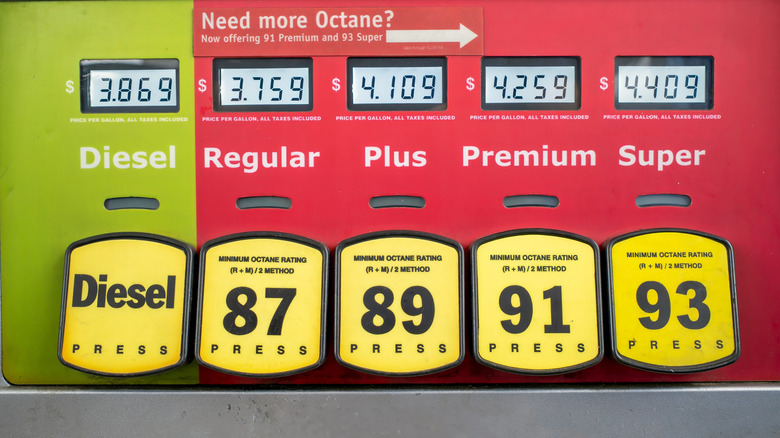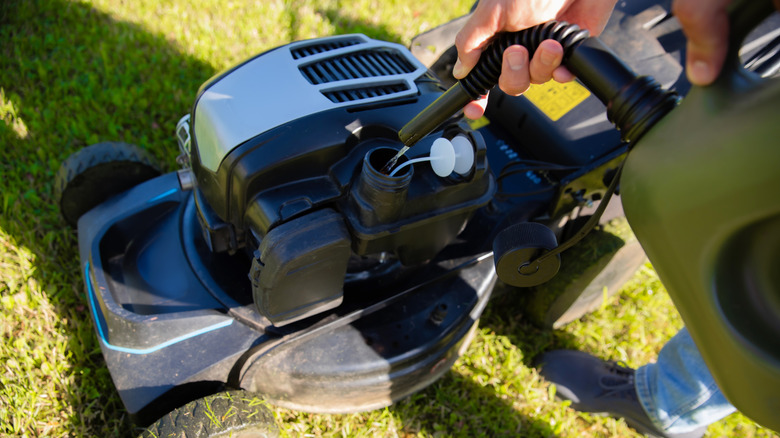The Long-Term Effects Of Using Premium Gas In A Lawn Mower
Premium gasoline is for cars. More specifically, it's for a relatively small number of them that have engines with high compression ratios, like sports cars. It makes high-performance engines run better, but it doesn't make normal models high performance ... and it probably won't do much for your lawn mower, either.
Premium gas is, fundamentally, just gas with an octane rating of 91 or higher. Because high-compression engines tend to cause fuel to ignite prematurely, octane boosters are used to make the fuel less explode-y, and therefore less likely to cause destructive engine knock. Premium gas might have other attributes that vary from brand to brand, but octane rating is the defining characteristic. This feature isn't useful for normal cars, which are calibrated for 87-octane regular gasoline, and it's not useful for mower engines, either. Using the wrong fuel is a mistake that can hurt your lawn mower engine, but some premium gas might have some useful attributes. The X factors, it turns out, are additives that can help your engine in the long run and, more importantly, make your gas stable for longer.
When it comes to running premium gas in your mower, there are three potential long-term effects you should be aware of. The biggest, by a mile, is higher cost. For the average homeowner with an average lawn, that might not be a big deal at all. The other two things to be on the lookout for are ethanol, a chemical that can damage your mower's fuel delivery components, and fuel stability, which can keep the fuel from breaking down and making your engine run poorly.
The effects of ethanol and other additives
We put a lot of stuff in our gas, and even more stuff in our premium gas. This seems like a bad idea. In the popular imagination, the fuel tank is sacrosanct — nothing but fuel goes in there, right? But the high-temperature, high-pressure environment that is a motor's cylinder is far more likely to be harmed by carbon deposits that build up over time than by the various additives that gasoline retailers add to the fuel. In fact, a 2016 AAA fuel-quality study established that using non-Top Tier fuel (without a particular set of detergents) leaves behind more than 19 times as much carbon as Top Tier fuel does.
In addition to detergents, the most common gasoline additive, you might also find friction modifiers, corrosion inhibitors, demulsifiers, anti-adhesion compounds, solvent fluids, octane boosters, and quite a few others. Premium gas like Shell V-Power NiTRO+ and Mobil Synergy Supreme+ are often billed as having more and better additives. Some might have a small effect on mower engines, while others, like those that affect fuel-injection systems, will have little or no benefit.
Octane boosters (these days, usually ethanol) can have both positive and negative long-term effects on mowers. About 95 percent of U.S. gasoline contains ethanol, so these effects are fairly common. One benefit is that higher-octane gas tends to be more stable to ensure older fuel doesn't break down as quickly and clog up components like carburetor jets. Unfortunately, a downside is that ethanol itself causes fuel to break down faster and — even in small quantities — eventually corrodes the components of a motor's fuel delivery system.
The other real long-term effect: cost
Premium gas is, of course, more expensive than regular 87-octane fuel, which is often cited as the biggest problem with using it in lawn mowers. Indeed, high gas prices affect homeowners in a number of ways. Over the past 12 months, premium gas averaged $4.067 per gallon, while regular averaged $3.154. Ethanol-free fuel, often recommended by small engine mechanics and enthusiasts, currently sells for an average of $3.89 per gallon.
The names of fuel options mostly make sense. After all, what's not to like about "premium" or "Top Tier?" "Regular" is, at least, regular, and even "ethanol-free" promises to remove something you might not want. But the gas that's most likely to benefit your mower motor in the long run (assuming you can find it) is recreational fuel, commonly called Rec-90. It's 90-octane and ethanol-free, so it has the stability benefits of higher octane fuel without the corrosive effects of ethanol. National gas price trackers don't regularly report Rec-90 prices, but at marinas it averages $5.21 per gallon.
If these prices sound terrifying, it's probably because you're thinking about the quantities of gas used in cars rather than mowers. We did the math, and you can expect a single mowing to cost $1.34 for premium, $1.04 for regular, $1.07 for regular Top Tier, $1.28 for ethanol-free, and $1.72 for Rec-90. The $1.28 and $1.72 ethanol-free options probably make the most sense. The one that doesn't make much sense at all for your mower is premium, which is fairly expensive at $1.34 and counterproductive because of its ethanol content, so you'd be far better off with $1.07 Top Tier regular gasoline.


